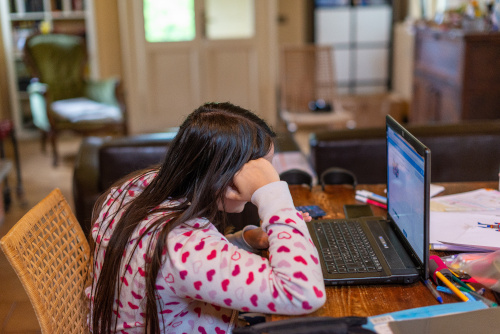Something I’ve learned about today’s youth is that their dealings with mental health are no longer as stigmatized as when I was young. And while it’s great to see kids feel comfortable talking about their struggles and receiving the help they need, it’s troubling to me to see just how many young people are struggling.
As a teacher of high school students at Destinations Career Academy of Colorado (CODCA), I have heard a lot of my students discuss their struggles with anxiety and depression since the start of the pandemic. But with that being said, I’ve seen how online learning has positively impacted and improved their mental health as we’re progressed through this global challenge.
Despite online learning being entirely…online, obviously…interacting with peers who are going through similar scenarios and teachers who can act as a support system can pull students out of abject isolation. In the following list, I dispel some preconceived notions of online learning and how the format can actually improve a student’s mental outlook.
Consistent socialization. The online, synchronous classroom setting has provided a consistent social aspect for my students in their day-to-day lives. I told them every day throughout the stay-at-home order how thankful I was to have our live classes so that I could still meet with them and talk with them on a daily basis. I think it helped give us all that human interaction we needed, especially when our face-to-face interactions (even with strangers) were so limited.
Because CODCA is always online, there are never any inconsistencies in what students are getting on a day-to-day basis. This can help alleviate potential anxieties of switching from online to in-person out of the blue.
Dedication to every student in a one-on-one setting. One of the biggest issues that students face in a brick-and-mortar setting that can really hold them back both mentally and academically is not having enough one-to-one interaction with their teachers. It’s much easier to navigate hosting these individual meetings in an online setting.
One-on-one meetings are essential, and I cannot emphasize it enough, for student success. This year especially, with my students in my English class, I’ve seen students who had trouble handling a group setting thrive after meeting in one-on-ones.
Flexibility. Earlier this year, I created and sent out a survey to my 10th grade students. Sixty-eight percent of them said they didn’t think it was important for them to be on their microphone or webcams during class. One response I received read: “I think the webcam is good for some cases, like for reading and doing classwork in groups. However, I think it can also make the class distracting if many people have their webcams on at a time.”
And although I do agree with that, having the option to turn your webcam/mic on or off is important for keeping students engaged in their community. Because at the end of the day, class is a community, and being part of something can seriously improve a student’s mental and academic success.
Having the option to turn a camera or microphone on or off isn’t the only way online learning provides flexibility. Students can also work at as slow or quick a pace as they find necessary, and having that optionality can really be beneficial to students trying to improve their mental health.
Looking towards a better future. Because CODCA is a career learning-based program, we are always thinking about the future and how students can build on their future careers early on.
I’ve talked with my students several times about how text-based communication is the way of the future (remote jobs, online college classes, etc.). Giving them a better idea of what their future holds really helps to alleviate the stresses of the unknown.
When it’s all said and done, online learning can do a lot to improve a student’s mental health during a time when it’s so hard not to feel isolated. It all goes back to that sense of community and a support system, and as long as kids, no matter what age, at the very least have that, they can find their footing once again!
- 4 ways to encourage play in education - April 25, 2024
- CoSN IT Leader Spotlight: Lisa Higgins - April 25, 2024
- It’s time to pay student teachers - April 25, 2024


